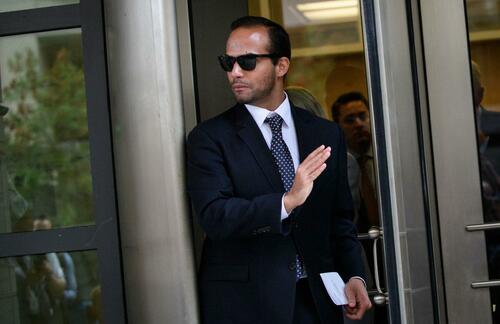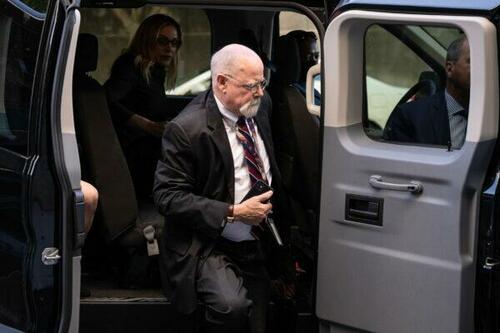The Biggest Revelation From The Durham Report
Authored by Hans Mahncke via The Epoch Times (emphasis ours),
Even as the dust is starting to settle over last week’s Durham Report revelations, it will take weeks, months, and perhaps even years to fully take in every aspect of the FBI’s scheme against President Donald Trump. However, there is little doubt that the report’s most crucial finding concerns the tip that led the FBI to open its investigation into the Trump campaign.
Until last week, the official story was that a Trump campaign adviser, George Papadopoulos, got drunk in a London bar and told an Australian diplomat, Alexander Downer, about a secret plot between Russia and the Trump campaign to defeat Hillary Clinton in the 2016 presidential race by anonymously releasing her emails. According to the official narrative, Downer took Papadopoulos’s information to the U.S. embassy in London, which then informed the FBI.
That tale about a drunken encounter at a London bar quickly became an unquestioned truism by sheer force of repetition in the media. It even became the central plot point in “The Comey Rules” TV mini-series, which depicted the official narrative of the alleged Trump–Russia collusion plot.
While Papadopoulos has always denied the story, the first official hint that something was amiss came when Justice Department Inspector General Michael Horowitz released his December 2019 report into the FBI’s handling of its investigation of the Trump campaign.
At the time, Attorney General Barr and then-federal prosecutor John Durham both issued statements that disagreed with Horowitz on the issue of predication of the investigation into then-candidate Trump and his campaign.
Horowitz determined that the FBI had properly opened the investigation, claiming that “we concluded that the FFG information [Australian diplomat’s tip] … describing a first-hand account from an FFG employee of a conversation with Papadopoulos, was sufficient to predicate the investigation.”
Barr issued a statement saying that the grounds for opening the investigation “were insufficient to justify the steps taken.”
Durham also disagreed, saying that “he had advised Inspector General Horowitz that he did not agree with some of the report’s conclusions as to predication and how the FBI case was opened.”
However, while it was clear that the disagreement centered on whether what the Australian diplomat said was sufficient to open a full investigation, neither Barr nor Durham provided any details.
But now, after a 3 1/2-year wait, special counsel Durham’s report finally sheds light on the details of the dispute.
In what is arguably the most important sentence of the entire 308-page report, Durham states that “According to [Alexander] Downer, Papadopoulos made no mention of Clinton emails, dirt or any specific approach by the Russian government to the Trump campaign team with an offer or suggestion of providing assistance.”
In one sentence, Durham crushed the FBI’s justification for the bureau’s Crossfire Hurricane investigation. There was no mention of Clinton’s emails, no mention of any dirt, and neither was there any mention of an offer from Russia. The official narrative, which the FBI not only used to open the investigation but also used to obtain FISA warrants on Trump campaign aide Carter Page, to push Acting Attorney General Rod Rosenstein to appoint a special counsel, and to pressure Congress into investigating Trump, was plain false.
Notably, the FBI also pushed its false story about Papadopoulos spilling the beans on Russia collusion during a drunken encounter at a London bar to the media.
According to Durham, Papadopoulos had met an Australian career diplomat in London on May 6, 2016. According to emails reviewed by The Epoch Times, that diplomat was Erika Thompson. Thompson then arranged a second meeting on May 10, which included Downer.
The day before Papadopoulos met Thompson, Fox News analyst Andrew Napolitano reported that it was a near-certainty that Russia had Hillary Clinton’s emails from her time as secretary of state. At the time, these emails were the subject of much speculation that Clinton had used an illicit private server for her communications instead of a State Department email account. Then, on the day before Papadopoulos met Downer, Napolitano reported that the Kremlin had possession of Clinton’s emails and was debating whether to release them.
The fact that Papadopoulos repeated a story that was being aired on Fox News, on a topic that many people were talking about at the time, was hardly newsworthy.
Downer later told Durham that the only thing of significance that Papadopoulos said was that “the Russians have information,” which matches what Napolitano reported on Fox News. It also matches what had previously been reported in Forbes magazine.
The exchange with Papadopoulos appeared so trivial that Downer didn’t come forward with his account of the encounter until July 26, 2016, a full 2 1/2 months after the meeting. Durham notes that he found no evidence that Downer’s information had undergone any analysis or scrutiny by Australian intelligence officials, again suggesting that Papadopoulos’s comment appeared insignificant.
Tip Reaches FBI Office
According to Durham, the reason why Papadopoulos’s insignificant comment about Russia having information on Clinton suddenly prompted Downer to take the information to the U.S. Embassy in London was the July 22, 2016, release by Wikileaks of allegedly hacked Democratic National Committee emails. At the time, the Clinton campaign was quick to blame Russia for the leak.
Downer’s tip reached FBI headquarters on July 28, 2016, and lead investigator Peter Strzok rushed to open a full investigation into the Trump campaign on July 31, before having even talked to Downer.
According to Durham, Strzok then interviewed Downer and Thompson in London on Aug. 2, 2016. Durham notes that Strzok’s own record of the interview is inconsistent with statements later made by the FBI investigator.
Specifically, Strzok wrote in his book, as well as telling Horowitz and TV interviewers, that Downer was prompted to come forward when he heard Trump say during a campaign speech, “Russia, if you’re listening, I hope you’re able to find the 30,000 emails that are missing.” However, Downer never said this and couldn’t have said it because he provided his information before Trump made his speech.
Read more here…
Tyler Durden
Tue, 05/23/2023 – 17:25


